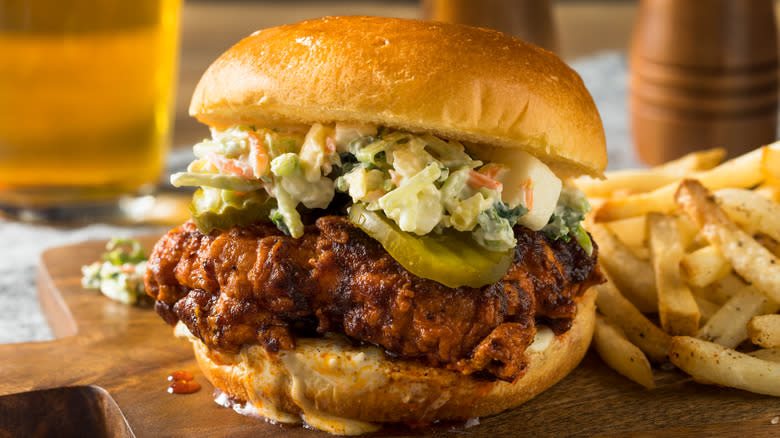The Main Difference Between Buffalo And Nashville Hot Chicken

Chicken and hot sauce seems like a match made in heaven; how did we even function before you could combine poultry with a spicy, tangy concoction that made your eyes water and your mouth leap for joy? And there isn't just one hot chicken style -- America has two that reign supreme, and each has its adherents. Whether Nashville hot chicken or Buffalo chicken is superior is in the taste buds of the beholder, but it's important to understand the differences between them because they are definitely not the same.
Both involve cayenne pepper, but they differ significantly. Despite Nashville's hotter reputation, both can involve wildly varying heat levels; you can find Nashville hot chicken that all but the most sensitive palates can accept and Buffalo chicken that will turn your mouth into a firebreak. Those are pretty much where the similarities end because not only do the two involve wildly different taste profiles and wildly disparate origin stories, but they're not even used the same way; Buffalo sauce is more of a finishing sauce, while Nashville hot is often a marinade.
Read more: 15 Tricks For Making The Most Crispy Chicken Thighs Ever
Buffalo Sauce Is Tangy, While Nashville Is Sweet

Though both Nashville hot chicken and Buffalo chicken have attained a level of nationwide prominence, there's no question which is more ubiquitous, as Buffalo wings are now a fixture on basically every bar menu in America. So you're probably familiar with how Buffalo sauce is used: Chicken wings (or other types of chicken now) are fried and then coated in a cayenne-based sauce resplendent with garlic, vinegar, and enough butter to operate a Wisconsin creamery for a month (it's fair to say it's more of a butter-based sauce than anything else). This mix of ingredients gives it its signature tangy yet rich taste.
Nashville hot chicken is a little more complex. Instead of being a finishing sauce to coat chicken, it's typically a paste used as a marinade before the chicken is cooked. Meanwhile, the core of the Nashville hot chicken mixture relies not just on cayenne but also on garlic, oil, brown sugar, and other spices. That brown sugar is a key component here because it gives Nashville hot chicken a sweet counterpoint to all the spice. The paste itself is also visually distinct; it's typically cayenne mixed with a fat to form a dark paste, meaning Nashville hot chicken is more of a dark orange-brown, while Buffalo chicken, owing to the mix of cayenne and butter, is much more likely to be violently orange.
Both Have Origin Stories That Are More Than A Little Questionable

There's one other thing they have in common: They both have disputed origin stories. The commonly accepted origin story of Nashville hot chicken is that a guy in Nashville, Tennessee, in the 1930s named Thornton Prince had a habit of being unfaithful to his lover, so she took revenge on him by coating chicken in tons of cayenne pepper. To her surprise, he loved it and started selling it himself. The problem with this story is that, like every fanciful food origin, there's a chance it's not true -- it may just be a little too neat.
Buffalo chicken's origin story, meanwhile, suffers a different problem. Teressa Bellissimo of Anchor Bar in Buffalo, New York, is commonly credited with creating Buffalo wings, but there are several other competing stories as to why; either she did it to feed Catholic regulars at midnight on Fridays (when they could start eating meat); she got a case of wings by mistake and made the best of it; or she just threw it together as a bar snack for her son's friends. Whichever of those stories (or none of them) is true, the other issue is that Belissimo isn't the only claimed inventor: John Young was also selling chicken wings in Buffalo around the same time (although his were distinctly different, particularly the sauce).
Read the original article on Daily Meal.

